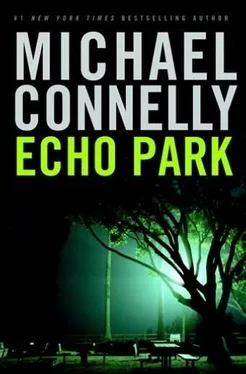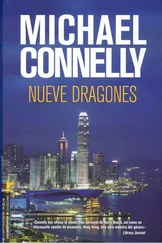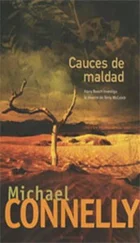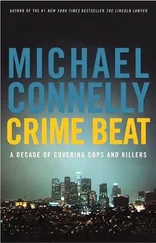Bosch didn’t think it was necessary to tell O’Shea that he had copied the Gesto file and taken it with him, along with several other open cases, when he left his badge behind and walked out the door in 2002. Copying the files had been an infraction of department regs, and the fewer people who knew that the better.
“In the last year I pulled the Gesto file every time I had a little time to work it,” he continued. “But there’s no DNA, no latents. There’s only legwork. I’ve talked to all the principals again-everybody I could find. There’s still the one guy out there who I always felt could be the guy, but I never could make anything out of it. I talked to him twice this year, leaned pretty hard.”
“And?”
“Nothing.”
“Who is it?”
“His name’s Anthony Garland. He comes from Hancock Park money. You ever heard of Thomas Rex Garland, the oilman?”
O’Shea nodded.
“Well, T. Rex, as he is known, is Anthony’s father.”
“What’s Anthony’s connection to Gesto?”
“‘Connection’ might be too strong a word. Marie Gesto’s car was found in a single garage attached to a Hollywood apartment building. The apartment it corresponded to was empty. Our sense of things at the time was that it wasn’t just coincidence that the car ended up in there. We thought whoever hid the car there knew the apartment was vacant and that he’d get a decent ride out of hiding it there.”
“Okay. Anthony Garland knew about the garage or he knew Marie?”
“He knew about the garage. His former girlfriend had lived in the apartment. She had broken up with him and then moved back to Texas. So he knew the apartment and the garage were empty.”
“That’s pretty thin. That’s all you had?”
“Pretty much. We thought it was thin, too, but then we pulled the ex-girlfriend’s DMV mug and it turned out she and Marie looked a lot alike. We started to think that maybe Marie had been some sort of replacement victim. He couldn’t get to his ex-girlfriend because she had left, so he got to Marie instead.”
“Did you go to Texas?”
“Twice. We talked to the ex and she told us that the main reason she split with Anthony was because of his temper.”
“Was he violent with her?”
“She said no. She said she left before it got to that point.”
O’Shea leaned forward.
“So, did Anthony Garland know Marie?” he asked.
“We don’t know. We are not sure he did. Until his father brought his lawyer into it and he stopped talking to us, he denied ever knowing her.”
“When was this?-the lawyer, I mean.”
“Back then, and now. I came at him again a couple times this year. I pressed him and he lawyered up again. Different lawyers this time. They were able to get a restraining order reissued against me. They convinced a judge to order me to stay away from Anthony unless he had a lawyer with him. My guess is that they convinced the judge with money. It’s the way T. Rex Garland gets things done.”
O’Shea leaned back, nodding thoughtfully.
“Does this Anthony Garland have any kind of criminal record before or after Gesto?”
“No, not a criminal record. He hasn’t been a very productive member of society-he lives off his old man’s handouts, as near as I can tell. He runs security for his father and his various enterprises. But there’s never been anything criminal that I could find.”
“Wouldn’t it stand to reason that someone who had kidnapped and killed a young woman would have other criminal activity on his record? These things usually aren’t aberrations, are they?”
“If you went with the percentages, yeah. But there are always exceptions to the rule. Plus, there’s the old man’s money. Money smooths a lot of things over, makes a lot of things go away.”
O’Shea nodded again like he was learning about criminals and crime for the first time. It was a bad act.
“What was your next move going to be?” he asked.
Bosch shook his head.
“I didn’t have one. I sent the file back to Archives and thought that was it. Then a couple weeks ago I went down and pulled it again. I don’t know what I was going to do. Maybe talk to some of Garland’s more recent friends, see if he ever mentioned Marie Gesto or anything about her. All I knew for sure was that I wasn’t going to give up.”
O’Shea cleared his throat and Bosch knew he would now get down to the reason they were there.
“Did the name Ray or Raynard Waits ever come up in all these years of investigating Gesto’s disappearance?”
Bosch looked at him for a moment, his stomach twisting.
“No, it didn’t. Should it have come up?”
O’Shea pulled one of the folders out of the accordion file and opened it on the desk. He lifted a document that looked like a letter off the top.
“As I said, we’ve made it public that we’re going for the death penalty on Waits,” he said. “After the prelim I think he realized the writing was on the wall. He’s got an appeal on the probable cause for the traffic stop. But it will go nowhere and he and his lawyer know it. An insanity defense is a nonstarter as well. This guy’s as calculating and organized as any killer I’ve ever prosecuted. So they responded last week with this. Before I show it to you I have to know that you understand that this is a letter from an attorney. It is a proffer. No matter what happens, whether we move forward with this or not, the information contained in this letter is off the record. If we choose to ignore this offer, no investigation can come of the information in this letter. Do you understand that?”
Rider nodded. Bosch didn’t.
“Detective Bosch?” O’Shea prompted.
“Maybe I shouldn’t see it, then,” Bosch said. “Maybe I shouldn’t be here.”
“You were the one who wouldn’t give Freddy the file. If the case means that much to you, then I think you should be here.”
Bosch finally nodded.
“Okay,” he said.
O’Shea slid the paper across the desk and Bosch and Rider leaned forward to read it together. Bosch first unfolded his glasses and put them on.
Sept. 12, 2006
Richard O’Shea, Assistant District Attorney
Los Angeles County District Attorney’s Office
Office 16-11
210 West Temple Street
Los Angeles, CA 90012-3210
Re: California v. Raynard Waits
Dear Mr. O’Shea:
This letter is intended to open discussions regarding a disposition in the above-referenced case. All statements made herein and hereafter in connection with these discussions are made with the understanding that they are inadmissible under California Evidence Code §1153, California Penal Code §1192.4 and People v. Tanner, 45 Cal. App.3d 345, 350, 119 Cal. Rptr. 407 (1975).
I suggest to you that Mr. Waits would be willing, on terms and conditions outlined below, to share with you and investigators of your choice information regarding nine homicides, excluding the two in the above-referenced case, and to plead guilty to the charges in the above-referenced case, in exchange for the People’s agreement not to seek the death penalty on the instant homicide charges or to file charges in regard to the homicides about which he would provide information.
Furthermore, in return for the cooperation and information Mr. Waits would provide, you must agree that any and all statements by Mr. Waits and any information derived therefrom will not be used against him in any criminal case; no information provided pursuant to this agreement may be divulged to any other state or federal law enforcement agencies unless and until those agencies, through their representatives, agree to be bound by the terms and conditions of this agreement; no statements made or other information provided by Mr. Waits during any “off-the-record” proffer or discussion may be used against him in the prosecution’s case-in-chief; nor may you make derivative use of or pursue any investigative leads suggested by any statements made or information provided by the defendant.
Читать дальше












